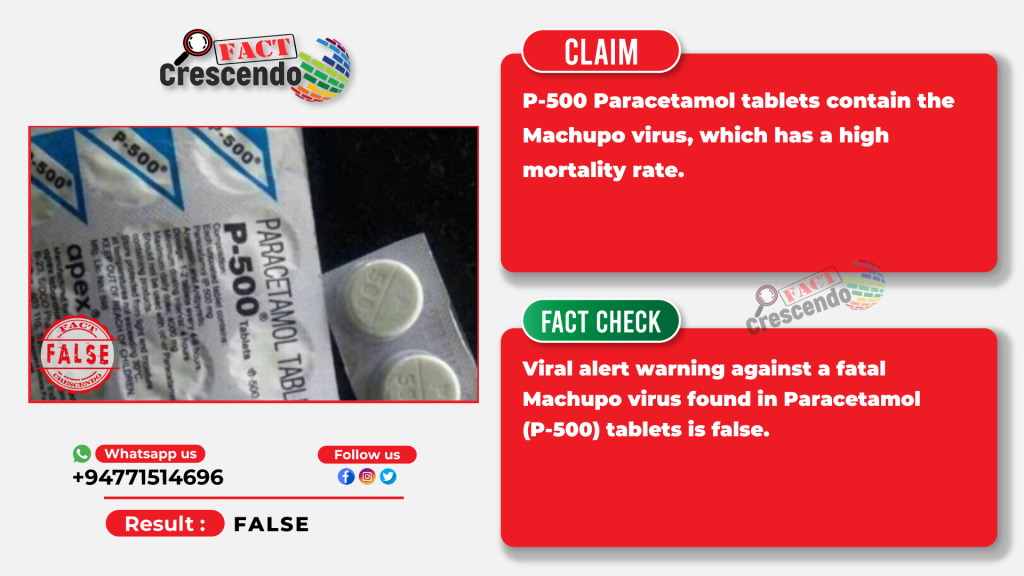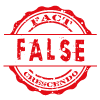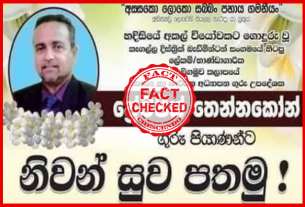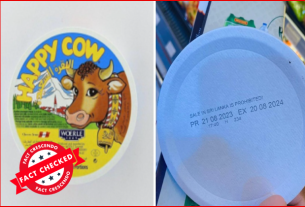
At a time when drugs and their pros and cons are increasingly being discussed, it is common to see the spread of falsehoods related to some of the drugs. This will not only mislead the public but can also create unnecessary fear.
Below is our investigation on one occasion where fake posts went viral among social media users, claiming that a Machupo virus was found in Paracetamol P-500!
Social Media Posts :
A message that warns people against using the Paracetamol P/500 has resurfaced on social media. The text of the hoax states, “URGENT WARNING! Be careful not to take the Paracetamol that comes written P-500. It’s new, very white and shiny Paracetamol. Doctors have proven to contain the “Machupo” virus, considered one of the most dangerous viruses in the world with a high mortality rate. Please share this message for all people and families and save a life from them.”

The message has gone viral in various ways, and we noticed that posts appeared on Facebook in 2017.

Fact Check :
Paracetamol is also known as acetaminophen in some countries. Paracetamol b longs to the category of analgesics as it relieves pain and is an antibiotic that lowers body temperature in cases of increased body temperature. This medicine can be given to small children through tablets, liquids and drops and produced in various ways. All over the world, this medicine is known by the pharmaceutical name of Paracetamol.
The drug paracetamol has many trade names. One such bran is called Panadol. There are about 30-40 brands of Paracetamol in the world, such as Paramol, maxmol, paracetol, astamol, pyrol etc., says Mrs Priyadarshini Galappatti, a professor of pharmacology at Colombo Medical Faculty.
Also, as mentioned in the social media post, Paracetamol is often available as 500 mg tablets in the market in Sri Lanka. However, an article published here states that the doses of Paracetamol to be given to young children and adults should be different, and taking more than the recommended amount can cause various complications.
Machupo mammarenavirus
Bolivian hemorrhagic fever (BHF), also known as black typhus or Ordog Fever, is a hemorrhagic fever and zoonotic infectious disease originating in Bolivia after infection by Machupo mammarenavirus. The disease was first encountered in 1962 in the Bolivian village of San Joaquín, hence the name “Bolivian” Hemorrhagic Fever. When initial investigations failed to find an arthropod carrier, other sources were sought before determining that infected mice carried the disease. Although most items were not the cause as initially suspected, the extermination of mosquitoes using DDT to prevent malaria proved to be indirectly responsible for the outbreak in that the accumulation of DDT in various animals along the food chain led to a shortage of cats in the village; subsequently, a mouse plague erupted in the town, leading to an epidemic. Read more.
Machupo Virus, or Bolivian Hemorrhagic Fever Virus, does indeed cause a severe, disseminated infection involving the central nervous system, gastrointestinal tract and lungs. As a result, haemorrhages appear in the skin, liver, oral cavity and adrenal cortex. As suggested n the message, the disease has a significant mortality risk. However, the transmission of the Machupo Virus usually happens via direct contact with infectious body fluids. Therefore, it is unlikely the virus sustains for such a long time in a dry environment, like in tablets, without a native host.
P-500 and Aeknil Paracetamol
The “P-500” tablets are claimed to be manufactured by Apex Laboratories Private Limited, while there are no manufacturing details on the “Aeknil Paracetamol’ tablets. There are no paracetamol products marketed in Singapore that Apex Laboratories Private Limited manufactures. In addition, SA has not received any reports of “Machupo” virus infections associated with using paracetamol tablets.
According to the warnings, new “very white and shiny” P/500 Paracetamol has become contaminated with the pathogen, posing a severe risk of infection. Unfortunately, these warnings typically appear alone, with no news reports or public health agency releases corroborating their claims.
There is no truth to the warning; public health officials have released statements confirming that the rumours were not credible. In addition, Indonesia’s Food and Drug Administration counterpart said the claim is a hoax. A viral rumour of virus-containing paracetamols is confirmed untrue by the Malaysian Health Ministry. Click here
The Malaysian Government released an official press release denouncing this hoax and stating that the tablet contains no virus.

In researching the ‘Machupo virus, we found an advisory note issued by the Singapore government’s Health Sciences Authority (HSA).
hsaupdates_machupoparacetamol-finalA news report by Thailand-based The Nation, dated November 4, 2020, stated that the country’s Digital Economy and Society Ministry, too, has debunked the alert. “Moreover, th Machupo virus cannot develop in a dry place. Therefore the chance it could have contaminated a tablet is meagre,” the report said.
Even though multiple newspapers, fact-checkers and government agencies have put out information stating that the data is a hoax, this message continues to be viral.
Follow us and stay up to date with our latest fact checks.
Facebook | Twitter | Instagram | Google News
Conclusion:
A viral alert warning against a fatal Machupo virus found in Paracetamol (P-500) tablets was false. Available reports suggest that the Machupo Virus infection cases appeared only in Central and South America.
These warning messages about the deadly Machupo Virus in Paracetamol tablets appeared online since at least February 2017 and went global. In August 2017, the Health Sciences Authority of Singapore clarified that the messages were false. Health officials ls in Malaysia also warned people about the rumours and asked people not to forward them.
Nonetheless, as a word of caution, buying and using medicines manufactured by registered companies is always safe.

Title:No, the P-500 Paracetamol tablet doesn’t have the Machupo virus
Written By: Pavithra SandamaliResult: False






